

Creative Commons & Copyright Info. Dancing can reverse the signs of aging in the brain. As we grow older we suffer a decline in mental and physical fitness, which can be made worse by conditions like Alzheimer's disease.
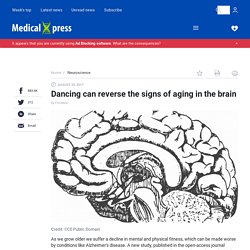
A new study, published in the open-access journal Frontiers in Human Neuroscience, shows that older people who routinely partake in physical exercise can reverse the signs of aging in the brain, and dancing has the most profound effect. "Exercise has the beneficial effect of slowing down or even counteracting age-related decline in mental and physical capacity," says Dr Kathrin Rehfeld, lead author of the study, based at the German center for Neurodegenerative Diseases, Magdeburg, Germany. "In this study, we show that two different types of physical exercise (dancing and endurance training) both increase the area of the brain that declines with age. Open Education, Open Questions. The use of open practices by learners and educators is complex, personal, and contextual; it is also continually negotiated.
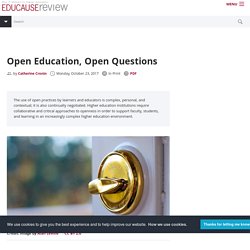
Higher education institutions require collaborative and critical approaches to openness in order to support faculty, students, and learning in an increasingly complex higher education environment. Whether we consider ourselves to be open education practitioners or researchers, advocates or critics, wonderers or agnostics, our motivating questions regarding openness are likely to be different, often very different. OER Resources. We encourage you to explore the links below, based on your interests and role in education.
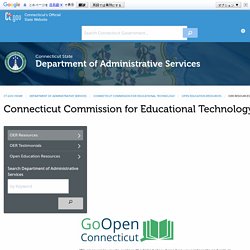
>> Guidance, Governance, and Leadership >> Training and Professional Development >> Content Collections >> Content Evaluation (Quality and Standards) Larry Lessig Fair Use Interview. Fair use is one of the fast-moving, shape-shifting targets in American law.
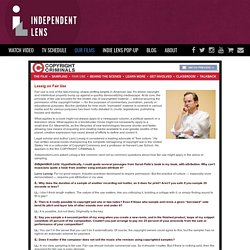
It’s where copyright and intellectual property bump up against a quickly democratizing mediascape. At its core, the principle of fair use provides for the limited use of copyrighted material — without securing the permission of the copyright holder — for the purposes of commentary, journalism, parody or educational purposes. But the yardstick for how much “borrowed” material is covered in various media and for various purposes has been hotly debated in courts, legislatures, publishing houses and studios. What applies to a book might not always apply to a newspaper column, a political speech or a television show. (30) TEDxNYED - David Wiley - 03/06/10. Open Pedagogy – Disposable Assignments vs. Renewable Assignments.
Submitted by Dave Braunschweig, Computer Information Systems At the Achieving the Dream 14th Annual DREAM Conference last week, David Wiley, Chief Academic Officer of Lumen Learning, spoke about the difference between disposable assignments and renewable assignments.
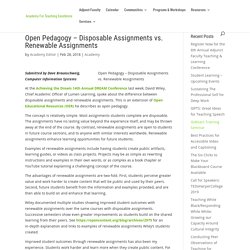
This is an extension of Open Educational Resources (OER) he describes as open pedagogy. The concept is relatively simple. Most assignments students complete are disposable. The assignments have no lasting value beyond the experience itself, and may be thrown away at the end of the course. Examples of renewable assignments include having students create public artifacts, learning guides, or videos as class projects. The advantages of renewable assignments are two-fold. Wiley documented multiple studies showing improved student outcomes with renewable assignments over the same courses with disposable assignments. Improved student outcomes through renewable assignments has also been my experience. Copyright and Creativity for Ethical Digital Citizens (Elementary School) - Presenter Instructions by iKeepSafe. OER Resources. MD 401H Module 6 Production: OER Action Plan.
Una cuenta.
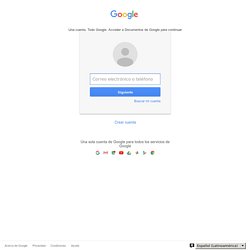
Todo Google. Acceder a Documentos de Google para continuar Buscar mi cuenta ¿Olvidaste la contraseña? Acceder con otra cuenta Crear cuenta Una sola cuenta de Google para todos los servicios de Google. ISKME's School Librarian OER Curation Framework. Open Pedagogy Notebook. Copyright and Fair Use Guidelines for Teachers and Schools. Measuring Fair Use: The Four Factors - Copyright Overview by Rich Stim. Unfortunately, the only way to get a definitive answer on whether a particular use is a fair use is to have it resolved in federal court.
Judges use four factors to resolve fair use disputes, as discussed in detail below. It’s important to understand that these factors are only guidelines that courts are free to adapt to particular situations on a case‑by‑case basis. In other words, a judge has a great deal of freedom when making a fair use determination, so the outcome in any given case can be hard to predict. The four factors judges consider are: the purpose and character of your usethe nature of the copyrighted workthe amount and substantiality of the portion taken, andthe effect of the use upon the potential market.
Creative Commons & Copyright Info. A Closer Look at Open Educational Resources. OER Testimonials. Open Education Resources (OER) Testimonials Hear from Connecticut students, educators, and leaders on how the use of OER has increased access to high-quality learning materials, broadened academic freedom, and decreased costs to learners and institutions across our state.
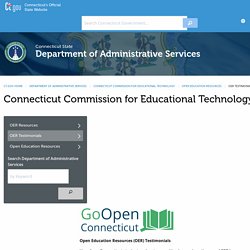
Open Education, Open Questions. What is Open Pedagogy? Hundreds of thousands of words have been written about open educational resources, but precious little has been written about how OER – or openness more generally – changes the practice of education.
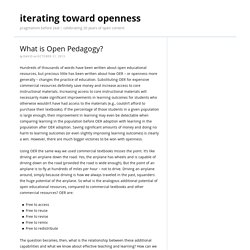
Substituting OER for expensive commercial resources definitely save money and increase access to core instructional materials. Increasing access to core instructional materials will necessarily make significant improvements in learning outcomes for students who otherwise wouldn’t have had access to the materials (e.g., couldn’t afford to purchase their textbooks). If the percentage of those students in a given population is large enough, their improvement in learning may even be detectable when comparing learning in the population before OER adoption with learning in the population after OER adoption. Saving significant amounts of money and doing no harm to learning outcomes (or even slightly improving learning outcomes) is clearly a win. Open Pedagogy Notebook. View of Defining OER-Enabled Pedagogy. On Shame and 'Daring Classrooms': We Need to Fix Systems, Not Kids - The Intersection: Culture and Race in Schools.
"But why is it that our kids need grit, instead of fixing the systems they have to fight?
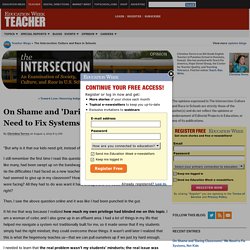
" I still remember the first time I read this question. I had only done two years in the classroom and, like many, had been swept up on the bandwagon of "grit" and "resillience" education. It felt good to tie the difficulties I had faced as a new teacher to a popular problem: How do I "fix" the kids who had seemed to give up in my classroom? How could I get them to push through the struggles they were facing?